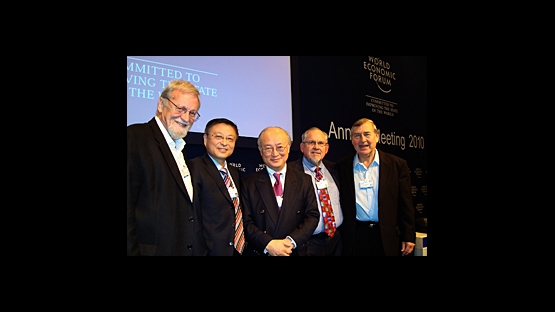On 28 January, 2010, IAEA Director General Yukiya Amano addressed leaders from business, politics and international organizations at the World Economic Forum in Davos, Switzerland, and stated that "cancer is a serious problem in developing countries; it should be recognized as a vital part of the global health agenda; and the IAEA can play an important role in improving cancer control in developing countries by using its expertise, in cooperation with the WHO."
Grim Facts
In his evening presentation on 28 January, Mr. Amano offered grim facts: the global cancer epidemic kills 665 people in developing countries every hour - nearly three times as many as in rich countries. Around 70% of all cancer deaths occur in developing countries and seven out of ten of these cases are diagnosed too late for life-saving treatment.
In many low-income countries, there is not a single radiation therapy machine. In the past, cancer in developing countries was under-reported, while almost no screening or early detection was available. The social stigma that is associated with the disease causes many patients to keep quiet about their condition, worsening the situation further.
Stopping Cancer´s Spread
To combat the disease´s spread in developing countries, Mr. Amano related examples of the Agency´s commitment to support Member State´s cancer control programmes, such as: establishing the Programme of Action in Cancer Therapy (PACT) in 2004, supporting training for medical personnel in an African regional cancer training network and the effort to create a virtual university for cancer control, which will help developing countries prevent, detect and diagnose the disease at an early stage.
Working Together to End Suffering
Mr. Amano emphasized that the IAEA does much more than nuclear non-proliferation. He explained that as Director General he made cancer control in developing countries a high-priority issue. One outcome of that decision is to focus on cancer control during the September 2009 Scientific Forum, the Agency´s annual forum that gathers renowned, international experts to discuss nuclear issues. In conclusion, Mr. Amano said, "We have to put an end to needless suffering and death in developing countries. Let´s work together to make it happen."
Background
The IAEA´s cancer control expertise lies in radiotherapy and nuclear medicine. Since 1980, the Agency has delivered over $220 million worth of cancer-related assistance to developing countries, providing both equipment and training.
In 2004, the IAEA launched the Programme of Action for Cancer Therapy (PACT), and works closely with the World Health Organization and other partners. PACT´s mission is to improve cancer survival in developing countries by integrating radiotherapy investments into public health systems. PACT meets its goals by building public-private partnerships, mobilizing resources from non-traditional sources and ensuring the effective and sustainable transfer of radiation medicine.
Currently under way in seven countries (Albania, Ghana, Nicaragua, Sri Lanka, United Republic of Tanzania, Vietnam and Yemen), PACT established PACT Model Demonstration Sites (PMDS) that are designed to showcase the synergies that international partners can achieve by working together with national counterparts to advance comprehensive cancer capacity-building in low- and middle income nations. The PMDS show that effective, sustainable national cancer control programmes and action plans can be developed and implemented to address the specific cancer needs of a nation. At the same time, the PMDS help raise donor and public awareness about the burden of cancer in developing countries, and the best strategies to address it.


